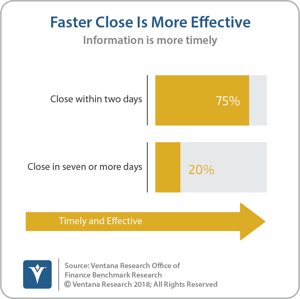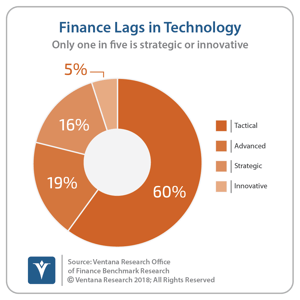Robots of the physical sort are not about to take over finance and accounting but we have arrived at the age of “Robotic Finance”. I coined this term to focus on four key technologies with transformative capabilities: artificial intelligence and machine learning, robotic process automation, bots and natural language processing and blockchain distributed ledger technology. Embracing these technologies will enable any department to redefine itself as a forward-looking strategic partner to the rest of the company.
Robotic finance isn’t a futuristic idea: The technologies are already here and will evolve rapidly over the next five years. CFOs are generally right to avoid the bleeding edge of technology; however, in a departure from past behavior, they should prepare their department to be a “fast follower” in information technology to ensure their company’s competitiveness. Fast followers are neither innovators nor laggards; rather, they apply a strategy of quickly imitating the innovations of their competitors.
For years people have been talking about “finance transformation,” that is, the remaking of the finance department into an organization that functions more as a strategic asset to the company – one that shifts its focus from what just happened to what’s happening next, one that provides greater visibility into how the company and each of the business units is performing. This finance department is looking at the big picture backed by details rather than obsessing over the details – doing bean counting, in other words – so that time is spent not making certain that the numbers are right but rather focused on deriving business meaning from the numbers.
Yet despite the potential that technology has created, not much has changed over the past 15 years. There is wide agreement on the need to complete the close within one business week, but our research has found no improvement in this important metric over this period. The close process is a particularly useful performance benchmark because all companies do it for the same purpose and they do it repeatedly.
Our Office of Finance benchmark research finds that companies with similar characteristics (for instance, they are in the same industry, are the same size and operate in the same geographic regions) complete their close process at significantly different intervals. The speeds with which these organizations close is, however, correlated with their use of technology. Most (71%) companies that apply a high degree of automation in their close process complete the process within six business days while just 23 percent that use little or no automation can close in this period.
How soon a company closes, in turn, has an impact on the timeliness of the information the finance organization provides executives and managers. Our research shows that 75 percent  of companies that complete their close within two business days say the information produced by the finance organization is timely. By contrast, only 20 percent of those working in companies that take seven or more business days to complete their close said the information they receive from the finance department is timely.
of companies that complete their close within two business days say the information produced by the finance organization is timely. By contrast, only 20 percent of those working in companies that take seven or more business days to complete their close said the information they receive from the finance department is timely.
There are many reasons why finance departments don’t use technology as effectively as they should. Technology vendors and systems integrators have consistently overpromised and under-delivered on benefits to finance departments. For their part, finance and accounting organizations tend to underinvest in software and technology and underutilize the capabilities of the systems they already have. Departments seem to view technology as a force of nature that they can’t control. But they can – and they should.
To be effective, finance departments must adopt a “fast-follower” approach to technology adoption. In practice this means establishing a standing group with clout that stays abreast of relevant technologies and anticipates their introduction into departmental processes. In the past, there might have been no penalty for a department to have a wait-and-see attitude, reacting slowly instead of finding opportunities to exploit technology capabilities when they become practical. Increasingly, though, delaying the application of technology to finance department processes has negative consequences. For example, companies that delayed applying automation to the new revenue-recognition standards are paying for it with heavy workloads.
A fast-follower approach is now a necessity because the four robotic finance technologies aren’t some futuristic dream. All are in use today. Artificial intelligence is at the core of fraud detection and AI programs built by Alibaba and Microsoft have edged out humans on a Stanford University reading comprehension test. Bots are a fixture in customer support and systems integrators are aggressively applying RPA to address data integrity issues that add to finance department workloads. Blockchain initiatives and demonstration projects ranging from securities trading to documenting the provenance of Thanksgiving turkeys are proliferating. To be sure, at this point the four technologies are at different maturity states  for different purposes and they will advance unevenly over the next five years. Some require and will continue to require a heavy dose of IT capabilities to get into place while others will shortly be adaptable by business users.
for different purposes and they will advance unevenly over the next five years. Some require and will continue to require a heavy dose of IT capabilities to get into place while others will shortly be adaptable by business users.
If your company is usually an innovator in using information-technology systems, then AI, blockchain and all the rest are either on your roadmap or top of mind. If your company is a fast follower in applying technology innovations, that’s still a good strategy. However, these two groups are in the minority. Our research found just 5 percent of finance departments are innovative in their use of technology and only 16 percent are strategic. Most finance departments (79%) lag and need to change their approach to adopting and using technology. The fast followers will have a very real advantage in utilizing robotic technologies because they will be ready to take advantage of technologies quickly. Those that pursue a wait-and-see strategy – and there will be many – will fall behind and underperform their peers.
Regards,
Robert Kugel
Senior Vice President Research
Follow me on Twitter
and connect with me on LinkedIn.

 of companies that complete their close within two business days say the information produced by the finance organization is timely. By contrast, only 20 percent of those working in companies that take seven or more business days to complete their close said the information they receive from the finance department is timely.
of companies that complete their close within two business days say the information produced by the finance organization is timely. By contrast, only 20 percent of those working in companies that take seven or more business days to complete their close said the information they receive from the finance department is timely. for different purposes and they will
for different purposes and they will








